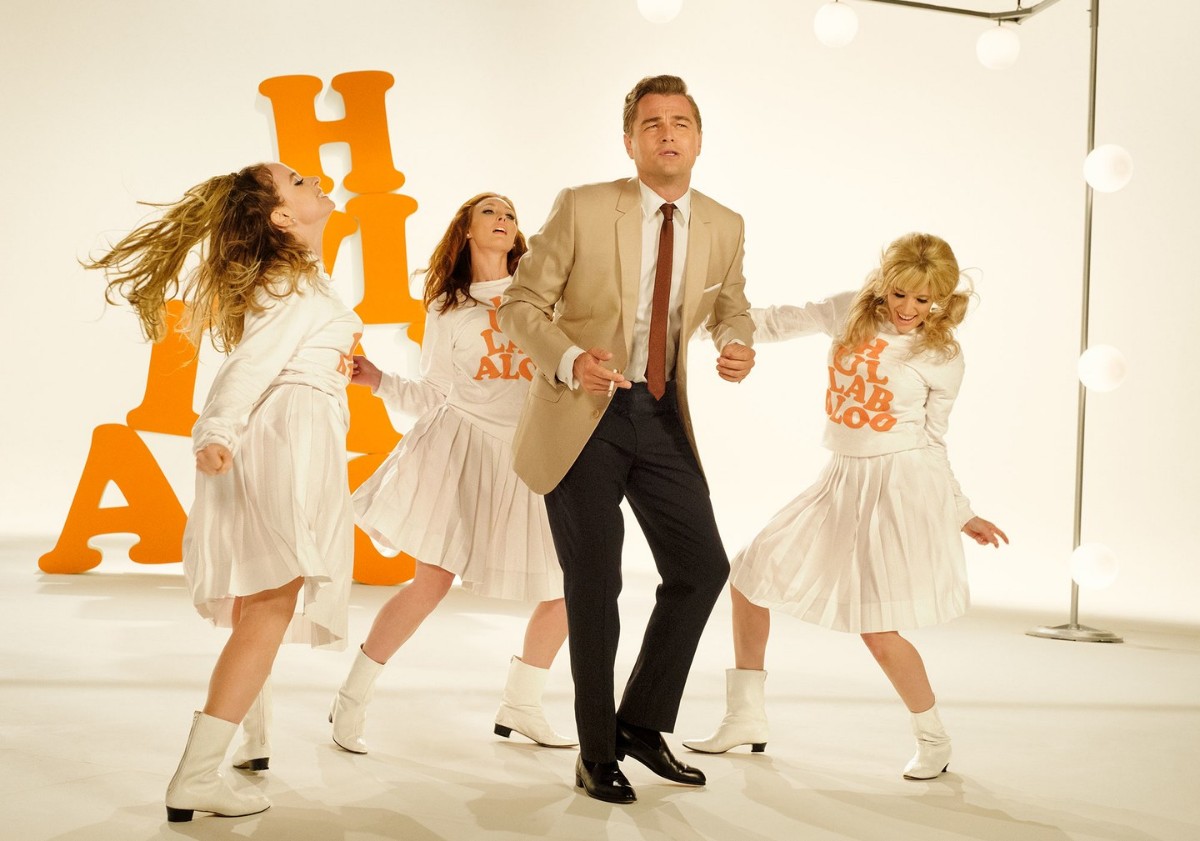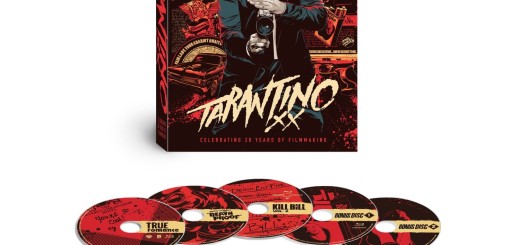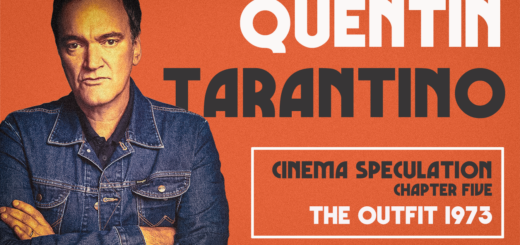Review: Once Upon a Time in… Hollywood

As Tarantino approaches the end of his filmography, he tells another original tale, this one about a time and place very close to him, about the end of one era as it violently clashes with the next. Set in 1969, Once Upon A Time In… Hollywood is the story of three people navigating, negotiating and enjoying their respective careers in a shared industry.
The story begins with Rick and Cliff. And Sharon. Three Hollywood denizens on different stratums of the industry. They exist very closely to one another, Rick does literally as Sharon’s next door neighbor and Cliff as Rick’s good friend, his old stuntman but now his driver/gofer/etc…
Rick Dalton, played by Leonardo DiCaprio, is a TV star managing his sunsetting career. He used to be a leading man on NBC’s Bounty Law but after a failed jump to the movies, he’s had to come back to TV, but now as a guest star. A few steps down from where he started. He seems to be booking guesting gigs just fine but even that’s not guaranteed forever. He sees the writing on the wall but can’t yet clearly read what it says. Rick sees his middle-age on the horizon too, as well as a few other looming threats. He might have an alcohol problem. He definitely has a developed speech impediment that graciously goes unaddressed by everyone else but you know it must be devastating his career. Maybe the alcohol isn’t helping either, except for coping. The stammer goes away when the cameras roll and the confidence soars, but comes back to stalk him between takes… and even sometimes during them, when his conviction dips and reality sets in.
Back in the day, Rick must’ve been a silver-tongued operator when he was Jake Cahill on Bounty Law but the sun set on that and now you can almost sense the unseen editors of the current shows he guests on who’ve had to cut around that stammer of his. A stutter which must be getting proportionally worse with his declining career, held together by his buddy Cliff Booth (Brad Pitt), by agent Marvin Schwarzs (Al Pacino) who tries to book him on Sergio Corbucci‘s next Spaghetti western and by the unheralded tv editors saving his performances on shows that he still manages to book.

Then there’s Cliff, Rick’s old stuntman and current driver/handyman/gofer. Cliff lives in the Hollywood hinterlands of Panorama City with his dog, Brandy, right by the Van Nuys Drive-In. Brandy gets some great screen time here, very much a juicy role that is sure to make the town’s showbiz dog owners and wranglers alike envious. Back to Cliff. He’s always on call, driving Rick from his home in the hills to the studio, Columbia Pictures (actually Paramount Studios dressed up to look like Columbia. Paramount really still has that old studio look, even today) and back. Cliff drives Rick to agent meetings at Musso’s and back. Running errands in between, doing handyman work, etc. Like Sam Jackson is one of the greatest actors to utter Tarantino’s dialogue, Brad Pitt might be another one. He brings his Aldo Raine character’s manner of speaking with him from Inglourious Basterds. Cliff is Cliff but you’ll think of Raine, his cadence, his drawl, that delivery, adjusted just a bit for Cliff. Pitt’s performance here will only create a thirst for more Tarantino/Pitt pairings.
Like Rick, Cliff has also seen better days as he was Rick’s stuntman when times were good. Cliff more than just works for Rick, he’s his friend. An actual one, something that may seem rare in that town. They’re good friends too, BFFs, decades before that was even a term. They share a symbiotic friendship that started as one of those tight Hollywood Actor-Stuntman relationships but later evolved into something closer off screen. Buddy cops without the guns or badges. One is a little more dependent of the other. One offers the other support in the form of work, the other offers support in the form of being his rock. Cliff’s less a father figure but more of an older brother to Rick, but either way, he’s there for him. He’s there for him as Rick races towards being a has-been. He’s there for him as Rick returns to his working-class actor roots. He’s there for him even though Rick still works above the line while Cliff certainly does not. And we are here for it, spending quality time with them, existing with them, hanging out with them. Much like the first 30-40 minutes of Jackie Brown, only much longer here. In a good way. We get some good quality time, hanging out with these guys before the plot begins to intrude.
At the end of the day they’re just good friends. Maybe with some drama but healthy drama, without the toxicity. Think Tony Stark and Rhodey from the first Iron Man, or maybe Tony and Happy in the later films. But with a tighter bond as this film has more privilege to explore that without the burden of constantly servicing the plot. They’re tight. We don’t ever see their weddings but we know exactly who the best man was at each.
It’s a friendship that may not survive in that same town 50 years later. Cliff might be misconstrued a little too problematic a few decades later. It’s even affecting him back in ’69 as Rick tries to pull strings to get Cliff work but Cliff is just Cliff. He was better able to survive the 50s but like Rick, he also struggles to get through the late 60s. He’s just a little cooler at it. We like him though, despite the industry gatekeepers who don’t. Unlike them, we get to know Cliff through an honest if not sympathetic lens. He’s a man of his time and just like Rick, he’s trying to keep up.
Last but not least, there’s Sharon, played wonderfully by Margot Robbie. Sharon’s only 26, a rising star and married to the hottest director in town. Having just moved into a rented house that some music producer previously lived in, they now live right next door to Rick in Benedict Canyon.
Sharon’s at the start of her career and the story gives us time to enjoy it along with her. We hang out with her just like we hang out with Rick and Cliff, with her friends, at the Playboy Mansion and when she’s running errands alone, as she picks up a book for her husband at a bookstore run by Clu Gulager! A shop that has a replica of the Maltese Falcon that Sharon admires. Maybe it’s the real thing. Sharon stops by a movie theater across the street that plays her most recent film, The Wrecking Crew (the last of the Dean Martin/Matt Helm movies) and we relish in her joy at seeing herself on screen.
While Rick and Cliff share the main story, Sharon is the star of hers, something she hasn’t gotten a chance to do yet in the movies this early in her career.

THREE DAYS IN… HOLLYWOOD
These two storylines, Rick & Cliff’s and Sharon’s take their time to unfold in the “day in the life” style. The story takes place over 3 days in 1969, one weekend in February and a day in August. There’s another, 3rd storyline that slowly creeps in over time, but more on that later.
Remnants of the recent but tumultuous past are present, in the background, we hear over a radio the status of Bobby Kennedy’s assassin, Sirhan Sirhan and experience a post-summer of love America. We begin on a Saturday night in February, months before man will first set foot on the moon. We hang out with Rick, Cliff and Sharon for the weekend, experience their drama, their career frustrations, their joy, watching movies and tv with ’em.
If there’s an act structure, the first 2 thirds of the film are act one. Not many can get away with this. Tarantino does. This is day in the life stuff. Sure there’s plot but character comes first.
After the time jump to August, man will have already taken that giant leap in the sky and so will the lives of Rick and Cliff. The world will have changed and Rick and Cliff will be racing to keep up. Just as humanity has taken the next step into the future, so has America and it gets hairy, especially that summer in Hollywood. An uneasy transition for those who have yet to settle in, facing an industry anxiety that the stars of the silent era must’ve felt too with the oncoming talkies, just over 40 years before.
Once Upon A Time In… Hollywood is about a changing era and after that jump to August, we come back to a world where we have already stepped foot on an other. But, before that jump…
BOUNTY LAW
Rick was the star of this western. Cliff, his stuntman. Times were good, now they’re not and they’re both getting old. These guys aren’t baby boomers, they’re older. Much older. Maybe they were part of the baby boom after the first World War but the real baby boomers are here now, young, and crowding Rick while hitching rides and hitting on Cliff.
Rick’s generational anxiety doesn’t come from the hippies he can’t stand but from elsewhere, from earlier in his career. He started in the 50s, was in that first generation of leading men on popular TV shows. He should’ve made the leap to movies like his peers, such as James Garner and Clint Eastwood before him. Like Steve McQueen, like Bill Shatner, like Bob Redford, Charlie Bronson and even Burt Reynolds (eventually).
This is the generational angst that Rick faces, haunting him years after he couldn’t make the jump himself. The generational divide doesn’t haunt Cliff as much but he still deals in his own way. Rick and Cliff will always have Bounty Law though, a show in which Rick was the star and Cliff his double. When Rick was an actor in his prime, playing his best role, Jake Cahill, on a show that may someday exist in our reality just as it does in Hollywood’s. Tarantino’s already written five episodes and has three more outlined. He doesn’t expect DiCaprio to come back and step into the role but he might just be underestimating himself, although DiCaprio does have a penchant for not repeating himself, never doing the same role twice. Just like Hollywood, Tarantino wants to shoot it on film, perhaps for Netflix, maybe HBO or Showtime. I’m sure they’ll all be courting him just like Sony and Warners did in November of ’17. Sony ultimately won that auction and now the torch-bearing Columbia Lady (circa 1969) adorns the start of Hollywood. The studio Cliff drives Rick to and from, Columbia. To get Tarantino and this project, Sony agreed to give him something even rarer than the already rare final cut, Sony gave him copyright. Something that George Lucas was able to get from Fox in the 70’s.

LANCER
While we may one day see DiCaprio reprise Jake Cahill on Bounty Law, that role and show is in Rick’s past and it’s not coming back. Rick’s now closer to his working class roots, taking acting gigs where he can get ’em, guest starring on shows like FBI and Lancer, a 20th Century Fox western that ran on CBS from 1968 to 1970 (although they seems to be shooting its pilot in February of 1969. Maybe not an historic error but a bit of invented history). While the agent Schwarzs warns Rick against taking these guest starring spots as the heavy every week, it still pays the bills and allows Rick to own his home, something not even his new celebrity neighbors do.
The working class actor theme is present. We see Rick struggle with his lower status as Cliff’s own stuntman status suffers. As Rick now lives next door to this rising star and her hot shot director husband, the grass is quite greener on the that side of the fence. Sharon’s just starting her career as Rick’s approaching the end of his.
Cliff drives a hungover Rick to his gig on Lancer and he’s suddenly accosted by the director and costumer (Courtney Hoffman) in the hair and makeup trailer. They dress him up, make him up and now Rick is acting opposite the star of the show, James Stacy (Timothy Olyphant) and Wayne Maunder (Luke Perry in his final role.)
Then there’s THE Lancer sequence. Between Rick and James Stacy. Several pages long, tons of camera set ups, even more takes but we fly right through in realtime as if we’re watching the finished product, except from a more modern lens with sharper color and more sophisticated camera set ups. It’s a scene that would take days to shoot which they probably pulled off in several hours back then on a 1969 TV budget and schedule, yet we zoom through in realtime without the distractions and interruptions of the shooting process. Here, a few minutes of screen time represents hours if not days of shooting and editing on Lancer. This has been done before, countless times, but usually as a tropey narrative device. Tarantino uses the same device to the same effect here but there’s something else going on under the hood as he once against jolts us through his cinematic spacetime. One can even imagine Rick and Cliff watching this scene themselves and laughing their asses off at the narrative shortcuts, but later maybe appreciating what’s really happening, as evident by a later scene on this day and a much earlier scene in Tarantino’s filmography.
After laughing at it, Rick and Cliff might be in awe as we travel through the spacetime of a Lancer shooting day, the scene composed already, all the camera set ups, all the best takes spliced together by a phantom editor who does not exist except to service our viewing pleasure of watching Rick’s personal reality. In the tropier version of that narrative device we might view the finished scene in real time as it would have appeared on CBS’s Lancer (though we get to watch clips of Bounty Law this way earlier). Here we view Lancer through Hollywood’s lens, not Lancer’s, with unfaded color and cinematic angles that you just couldn’t pull off on a 60’s TV western’s budget/schedule.
Rick shares a moment with James Stacy afterwards where they hang out like the two actors that they are, sharing a moment together but not their status, talking their trade, commiserating over lost gigs. One the star of his own show, the other that week’s (or this pilot’s) heavy. Two working actors talking, shooting the shit, dwelling over that The Great Escape role that Rick was supposedly up for that wound up ultimately going to someone else. And this hurts Rick, the painful memory, the sting, we can almost hear it. As he tells the story, we see Rick’s would be scene from The Great Escape with Rick in the scene! A scene that never existed except in conversations beginning with “what if.” Once more we get to transverse Tarantino’s filmic spacetime removed momentarily from reality and dropped right into the reality of Rick’s unrealized potential. It’s a bittersweet memory. The “sweet” coming from a scene that doesn’t exist. The “bitter” coming from the reality that does, of Rick losing out on the role of his life, a part that went to the original smooth operator himself, Steve McQueen.
McQueen happens to show up earlier in the film where we get to run into him at the Playboy Mansion before he decides to tell us a story. This was February of ’69, he was between films, hot off of 1968’s Bullitt.
Tarantino’s current filmic wormholes are pretty reminiscent of Reservoir Dogs‘ Mr. Orange (Tim Roth) meeting up with his buddy cop, Holdaway, before we flash back to the beginning of that chapter as Orange learns a prepared anecdote to be used when he’s chilling undercover with a crew he’s trying to penetrate. We travel all over Tarantino’s filmic spacetime here, first by jumping to an earlier chapter of the story, then flashing back to the chronological beginning of that chapter, then slowly progressing forward in time as Orange learns this anecdote like an actor learns a monologue, then to the point where he’s expertly reciting the story to the crew, and then we jump straight into the actual anecdote THAT NEVER HAPPENED. We jump into his fiction. And if that ride isn’t wild enough, in this non-existent scene that we are experiencing, there’s a bunch of cops in the room sharing their own anecdote — you don’t need to diagram how Tarantino thrusts us through the wormholes of his filmic spacetime but it may be rewarding if you do. We have fun with these narrative thrusts for a while before Hollywood’s reality starts to set in.

LONG-HAIR HIPPIE SCUM
As Rick and Cliff live their lives, they clash with the oncoming counter culture. A wave of baby boomers when they were still young, when they were dousing the streets with sexual energy, hitching rides with tourists, locals, screaming “PIGS” at cops and hitting on men old enough to nowadays be described as “of the silent generation.”
Cliff is right to verify the age of Pussycat, played exuberantly by Margaret Qualley. As Brad and Leo play their roles well, we never forget who they are, two stars playing two guys who aren’t so lucky. They escape into their roles as best they could. But we don’t forget. Margot Robbie escapes deeper in hers. For the running time of the film, she IS Sharon Tate. Then there’s Margaret Qualley who plays the role of Pussycat with a natural yet buoyant energy, she is the realest character in Hollywood.
Cliff gives Pussycat a ride to Chatsworth, the Spahn Ranch, where he used to work as a stuntman. It’s not so much a compound as it is a commune of squatting hippies, those damn baby boomers, getting high, getting laid and watching lotsa TV in between. These hippies represent a threat to Rick. They’re not going to replace him but their TV heroes one day might, like Michael Douglas in The Streets of San Francisco. As for Cliff, he’s just along for the ride.
The counter culture deals with the new age their own way as Rick deals with the changing zeitgeist in his own, clashing with the hippies, a building anger not at them but towards something they represent, the end of his career. It’s a clash between the youngs and the olds, where Rick finds himself on the dying side of that equation. Not Cliff though. Being a bit older than Rick, Cliff’s been around long enough to know to go with the flow and being the expert stuntman that he is, to roll with the punches.
Cliff may have seen this thing before, this generational shift, he may have even been a part of one. Now he’s more of an observer and just enjoying the ride as he sees the younger Rick who is new to dealing with the prospect of getting old.
As Cliff visits his old friend at Spahn Ranch, the happy energetic vibe of the film becomes something else, something ominous. So many hippie boomer teens hanging out at the ranch, something is amiss. Their leader is out of town. The guy in charge, Tex Watson (Austin Butler), gives horse riding lessons to visitors Curt and Connie. Tex is another squatting hippie in the commune squatting in this ranch. He’s somewhat in charge, perhaps anointed by Charlie, their leader, who’s up in Santa Barbara for something. Tex works the ranch offering horse riding tours to tourists and visitors alike.

At the ranch we meet Dakota Fanning as Squeaky Fromme, the mama bear (a few years away from trying to kill President Ford). She presides over the Manson girls while Charlie’s away and Tex gives horse riding tours. This commune has its unapparent appealing qualities, a family in a safe haven from the changing Southern Californian landscape.
THE CUTTING ROOM
Fred Raskin‘s editing. Seamless and invisible. For the most part. The moments that aren’t are the function of the tone and story and not the filmmakers. In some ways Hollywood is very different than Tarantino’s first 8 pictures. We get more hang out time with the characters, our friends. With more hangout time, there might be complaints about plot but that would be unfair as character IS plot here. Two friends navigate the drama of their receding careers. A rising star enjoys the beginning of hers.
Maybe a bit unconventional for such an important and big summer movie but it’s to be appreciated that these simple stories that tap into the human condition can be told in such a crowded marketplace of tentpole films. An adult tentpole movie for children of the 60s… and those who wish they were. The times are always changing but Tarantino doesn’t adjust his films for a changing zeitgeist, he’s the one who changes it.
It’s good to have Fred Raskin back behind the wheel of the Avid, sitting at the Avid helping Tarantino whittle down the story like he did on Django Unchained. Being the “hang out movie” that this is, both Raskin and Tarantino let the story breath, an advantage many of today’s top filmmakers are rarely afforded.
Comparisons to earlier stages of Tarantino’s career might be made, comparisons to the Sally Menke films. In those films, his editor Sally may have been a mentor to Quentin, helping him find the story in the cutting room and helping him fine tune them for public consumption as audiences simply weren’t ready for films of Hollywood’s caliber back then. Now Tarantino may be the mentor to Raskin, the Sally to his Quentin. The mentoring relationship between director and editor may be reversed here but maybe it’s still just as symbiotic as it was during the Sally years.
Like any good storyteller, filmmaker, editor, Raskin and Tarantino leave us wanting more. We’d be gifted to see more of Rick Dalton, more episodes from his Bounty Law series, that Lancer he guested on, the western he later did with Sergio Corbucci and those other 3 films he made in Rome. One can imagine NEBRASKA JIM was heavy on action, low on dialogue, Corbucci shooting and editing around Rick’s gradually vanishing stutter and not having to do so much of that on the Good Rick Days. Perhaps Rick benefited from doing those Spaghetti ADR sessions, taking another stab and adjusting his performance one last time with more confidence in post, maybe even doing the English line readings for some of his non-English speaking co-stars or a featured player he may have befriended on location just as James Stacy befriended him, a buddy he made on set who can one day boast in his native Italian, “you hear the English version of my Nebraska Jim lines, you know who that is!? Rick Dalton!”

The details of the era that are on screen, from practical to artificially generated, from visual to audible, from what’s on the walls to what people wear, from the TV that they watch to the radio that they listen to, are all so specific. You can almost feel the loving research that went into this and wonder how much of it ended up as a nostalgic dive into Tarantino’s own youth, when he was six and then seven at the time of this story. You may also feel the internet’s contribution to research and writing to not just this film but many other modern films, a level of detail that some older pre-internet films didn’t attain at such a regular pace like the movies of today do.
Once Upon a Time in… Hollywood may be Tarantino’s maturest film yet, at least since Jackie Brown, another story about getting older and the diminishing amount of opportunities that lie ahead. A thought that reverberates as we near the end of Tarantino’s own cinematic output.
To paraphrase the man himself,
Once Tarantino completes his oeuvre,
Hollywood will never see his like again.
Join us in our message boards to discuss the movie and post your thoughts once you see it. It opens today in the U.S. and starting mid-August in most other territories. Also follow us on Twitter here. Click here to learn everything about the movie there’s to know. Click here to read one of our previous articles about 10 films QT wants you to see that inspired him for this film.














Send some of the vinyl limited edition soundtracks to the Bay Area, Streetlight in San Jose. We need them here also.
I spotted 2 Easter eggs, Barnabas Collins’ cane and the Maltese Falcon in Once Upon a Time
My girlfriend caught the Antionio Margheretti alias from IB in this one. Caught me off guard hard, he is like a cameraman or something.
Wow, one of the most comprehensive reviews I have ever read! Extremely well written, detailed, and very fair.
Every review I have read so far however, I feel, has missed a vital theme in this film. My theory is that the entire film is a metaphor for America and Rick and Cliff symbolize the two halves of the split-personality that America has become…
I elaborate into theory further in my new blog if you are interested:
https://www.shadowfaxblog.com/post/once-upon-a-time-in-hollywood-my-spoilerific-fan-theory